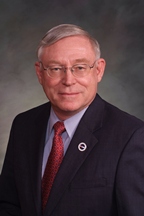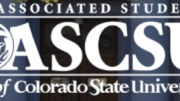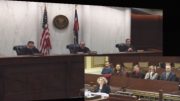By Jeffrey A. Roberts
CFOIC Executive Director
The sponsor of a 2012 ban on the use of secret ballots by city councils and other public bodies in Colorado said Friday he has requested permission to introduce a bill this session making it clear that any citizen has legal standing to challenge violations of the law.
Rep. Bob Gardner, R-Colorado Springs, said he is “astounded” that a Jefferson County judge dismissed a lawsuit claiming that Arvada City Council members illegally installed new member Jerry Marks on Jan. 10 when they marked unsigned pieces of paper four times to eliminate other candidates.
The judge’s ruling “flies in the face of the (state) open meetings act,” Gardner said. “The very point of the act is transparency in government for all citizens, not just people who are directly affected. Every citizen ought to have standing.”
District Court Judge Margie Enquist acknowledged in her Mar. 30 decision that “the voting procedure may have violated the secret ballot provision” of Colorado’s Sunshine Law. But she nonetheless ruled in Arvada’s favor because the two-year-old law does not expressly “confer standing on every citizen for a violation of that provision,” and Arvada resident Russell Weisfield couldn’t prove that he was personally injured by the council’s hidden votes.
Gardner sponsored HB 12-1169 after the Colorado Court of Appeals ruled that the Fort Morgan City Council did not violate the Open Meetings Law when it used anonymous written ballots to appoint two council members and a municipal judge in 2009 and 2010. With only a few exceptions, his bill prohibits the state or any local public body from using secret ballots to adopt “any proposed policy, position, resolution, rule, or regulation” or to take “formal action.”
“When we carried the legislation to make it clear that a secret ballot wasn’t permitted, it didn’t really occur to us that we needed to make it explicit that citizens have standing,” Gardner said. “Courts have held in open-meetings cases that citizens have standing.”
This far into the 2014 session, Gardner will need permission from legislative leaders to introduce a bill. He is optimistic that permission will be granted, he said, because there is bipartisan support for clarifying the question of legal standing.
Weisfield, meanwhile, told the Colorado Freedom of Information Coalition that his lawyers are preparing an appeal.
Follow the Colorado Freedom of Information Coalition on Twitter @CoFOIC. Like CFOIC’s Facebook page. Do you appreciate the information and resources provided by CFOIC? Please consider making a tax-deductible donation.





